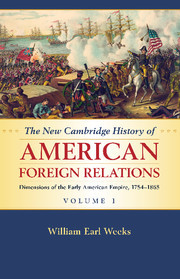Description
The New Cambridge History of American Foreign Relations: Volume 1, Dimensions of the Early American Empire, 1754–1865
The New Cambridge History of American Foreign Relations Series
Author: Weeks William Earl
This new first volume proposes that the British North American colonists' desire for expansion, security and prosperity is the essence of American foreign relations.
Language: English
Subject for The New Cambridge History of American Foreign Relations...:
Approximative price 38.06 €
In Print (Delivery period: 14 days).
Add to cart
The New Cambridge History of American Foreign Relations: Volume 1, Dimensions of the Early American Empire, 1754-1865
Publication date: 04-2015
Support: Print on demand
Publication date: 04-2015
Support: Print on demand
Approximative price 50.13 €
In Print (Delivery period: 14 days).
Add to cart
The New Cambridge History of American Foreign Relations
Publication date: 02-2013
336 p. · 15.8x23.5 cm · Hardback
Publication date: 02-2013
336 p. · 15.8x23.5 cm · Hardback
Description
/li>Contents
/li>Biography
/li>
Since their first publication, the four volumes of the Cambridge History of American Foreign Relations have served as the definitive source for the topic, from the colonial period to the Cold War. This entirely new first volume narrates the British North American colonists' pre-existing desire for expansion, security and prosperity and argues that these desires are both the essence of American foreign relations and the root cause for the creation of the United States. They required the colonists to unite politically, as individual colonies could not dominate North America by themselves. Although ingrained localist sentiments persisted, a strong, durable Union was required for mutual success, thus American nationalism was founded on the idea of allegiance to the Union. Continued tension between the desire for expansion and the fragility of the Union eventually resulted in the Union's collapse and the Civil War.
1. Origins of the American empire and union; 2. A perilous union, 1783–96; 3. The 'Empire of Liberty' on land and sea; 4. Towards hemispheric superiority; 5. Freedom's empire; 6. Expansionist vistas: Canada, Oregon, California and Texas; 7. Bullying Britain, conquering Mexico, claiming the canal; 8. Disunion; 9. The imperial crisis, 1861–5.
William Earl Weeks is Lecturer in History at San Diego State University. He is the author of John Quincy Adams and American Global Empire (1992) and Building the Continental Empire, 1815–1861, and co-editor of American Foreign Relations since 1600: A Guide to the Literature (2003).
© 2024 LAVOISIER S.A.S.




